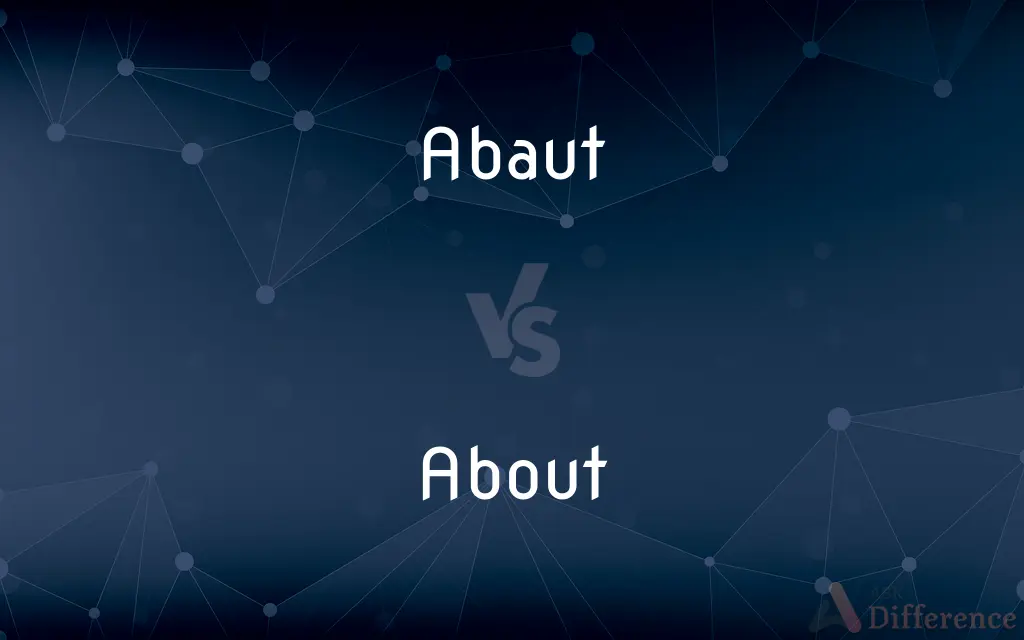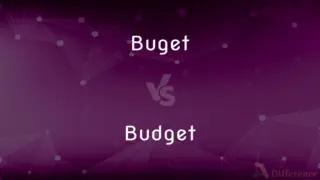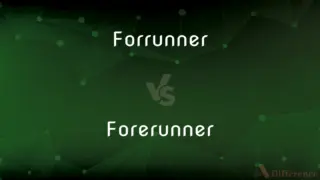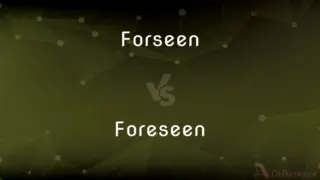Abaut vs. About — Which is Correct Spelling?
Edited by Tayyaba Rehman — By Fiza Rafique — Updated on April 3, 2024
Abaut is an incorrect spelling. The correct spelling is "About," referring to the subject or topic of something or its proximity in relation to something.

Table of Contents
Which is correct: Abaut or About
How to spell About?

Abaut
Incorrect Spelling

About
Correct Spelling
ADVERTISEMENT
Key Differences
The word "about" sounds like "a boat" without the "t" sound.
Remember it has "out" in it, just with an "a" at the beginning: A-bOUT.
Visualize the phrase "thinking about it," with the correct spelling.
Associate "about" with common phrases you know: "about time" or "about-face."
Always double-check that there's a single "a" at the start.
ADVERTISEMENT
How Do You Spell About Correctly?
Incorrect: We need to talk abaut your grades.
Correct: We need to talk about your grades.
Incorrect: He asked me abaut the meeting time.
Correct: He asked me about the meeting time.
Incorrect: Can you tell me more abaut your project?
Correct: Can you tell me more about your project?
Incorrect: What do you think abaut this idea?
Correct: What do you think about this idea?
Incorrect: She was curious abaut the new teacher.
Correct: She was curious about the new teacher.
About Definitions
Approximately or nearly.
There were about fifty people at the party.
In rotation or movement.
She turned about and left.
On the verge of doing something.
The clock is about to strike midnight.
Approximately; nearly
The interview lasted about an hour.
Almost
The job is about done.
To a reversed position or direction
Turn about and walk away slowly.
In no particular direction
Wandering about with no place to go.
All around; on every side
Let's look about for help.
In the area or vicinity; near
Spoke to a few spectators standing about.
In succession; one after another
Turn about is fair play.
On the verge of doing something; presently going to do something. Used with the infinitive
The chorus is about to sing.
Usage Problem Used to show determination or intention in negative constructions with an infinitive
I am not about to concede the point.
On all sides of; surrounding
I found an English garden all about me.
In the vicinity of; around
Explored the rivers and streams about the estate.
Almost the same as; close to; near.
In reference to; relating to; concerned with
A book about snakes.
In the act or process of
While you're about it, please clean your room.
In the possession or innate character of
Keep your wits about you.
Moving here and there; astir
The patient is up and about.
Being in evidence or existence
Rumors are about concerning his resignation.
In a circle around; all round; on every side of; on the outside of.
The snake was coiled about his ankle.
Over or upon different parts of; through or over in various directions; here and there in; to and fro in; throughout.
Rubbish was strewn about the place.
The children were running about the room.
He was well known about town.
Indicates that something will happen very soon; indicates a plan or intention to do something.
(with 'to' and verb infinitive) See about to.
On the point or verge of.
Concerning; with regard to; on account of; on the subject of; to affect.
He talked a lot about his childhood.
We must do something about this problem.
Concerned with; engaged in; intent on.
To be about one's business
Within or in the immediate neighborhood of; in contiguity or proximity to; near, as to place.
I can't find my reading glasses, but they must be somewhere about the house.
John's in the garden, probably somewhere about the woodshed.
On one's person; nearby the person.
I had no weapon about me but a stick.
(figurative) In or near, as in mental faculties or (literally) in the possession of; under the control of; at one's command; in one's makeup.
He has his wits about him.
There was an air of confidence about the woman.
On all sides; around.
I looked about at the scenery that surrounded me.
Here and there; around; in one place and another; up and down.
Bits of old machinery were lying about.
From one place or position to another in succession; indicating repeated movement or activity.
Walking about;
Rushing about;
Jumping about;
Thrashing about
Indicating unproductive or unstructured activity.
Messing about;
Fooling about;
Loafing about
Nearly; approximately; with close correspondence in quality, manner, degree, quantity, or time; almost.
It's about as cold as it was last winter.
He owes me about three hundred dollars.
Dinner's about ready.
I was so scared, I about fainted.
Near; in the vicinity.
To a reversed order; half round; facing in the opposite direction; from a contrary point of view.
To face about;
To turn oneself about
(nautical) To the opposite tack: see go about.
We went about and headed offshore.
In succession; one after another; in the course of events.
(archaic) In circuit; circularly; by a circuitous way; around the outside; in circumference.
A mile about, and a third of a mile across
Moving around; astir.
Out and about;
Up and about
After my bout with Guillan-Barre Syndrome, it took me 6 months to be up and about again.
In existence; being in evidence; apparent.
This idea has been about for a while but has only recently become fashionable.
Near; in the vicinity or neighbourhood.
I had my keys just a minute ago, so they must be about somewhere.
Watch out, there's a thief about.
Around; all round; on every side of.
In the immediate neighborhood of; in contiguity or proximity to; near, as to place; by or on (one's person).
Near; not far from; - determining approximately time, size, quantity.
He went out about the third hour.
In concern with; engaged in; intent on.
I must be about my Father's business.
On the point or verge of; going; in act of.
Paul was now aboutto open his mouth.
Concerning; with regard to; on account of; touching.
She must have her way about Sarah.
In circuit; circularly; by a circuitous way; around the outside; as, a mile about, and a third of a mile across.
Here and there; around; in one place and another.
Wandering about from house to house.
Nearly; approximately; with close correspondence, in quality, manner, degree, etc.; as, about as cold; about as high; - also of quantity, number, time.
To a reserved position; half round; in the opposite direction; on the opposite tack; as, to face about; to turn one's self about.
On the move;
Up and about
The whole town was astir over the incident
(of quantities) imprecise but fairly close to correct;
Lasted approximately an hour
In just about a minute
He's about 30 years old
I've had about all I can stand
We meet about once a month
Some forty people came
Weighs around a hundred pounds
Roughly $3,000
Holds 3 gallons, more or less
20 or so people were at the party
All around or on all sides;
Dirty clothes lying around (or about)
Let's look about for help
There were trees growing all around
She looked around her
In the area or vicinity;
A few spectators standing about
Hanging around
Waited around for the next flight
To or among many different places or in no particular direction;
Wandering about with no place to go
People were rushing about
News gets around (or about)
Traveled around in Asia
He needs advice from someone who's been around
She sleeps around
In or to a reversed position or direction;
About face
Brought the ship about
Suddenly she turned around
In rotation or succession;
Turn about is fair play
(of actions or states) slightly short of or not quite accomplished; `near' is sometimes used informally for `nearly' and `most' is sometimes used informally for `almost';
The job is (just) about done
The baby was almost asleep when the alarm sounded
We're almost finished
The car all but ran her down
He nearly fainted
Talked for nigh onto 2 hours
The recording is well-nigh perfect
Virtually all the parties signed the contract
I was near exhausted by the run
Most everyone agrees
Relating to or concerning the subject.
I read a book about space.
Present in a location.
Is John about today?
About Meaning in a Sentence
I was about to call you when you walked in.
What is this book about?
I'm not sure what she's upset about.
Can we talk about your plans for the weekend?
He knows a lot about ancient history.
What's so funny about that joke?
She's always worrying about the future.
He's about to leave for work.
There's something magical about this place.
What do you like most about your job?
I have a question about the homework.
They've been arguing about the same thing for hours.
There's nothing we can do about the weather.
They're about to announce the winners.
I feel good about our chances of winning.
It's about time we started thinking about our future.
We need to be careful about how we proceed.
She's very passionate about environmental issues.
I'm excited about the trip next month.
There's something about her smile that lights up the room.
He's been dreaming about this moment for years.
He gave a speech about the importance of education.
Is there anything we can do about the situation?
What did you do about the problem?
He wrote a poem about love and loss.
About Idioms & Phrases
About time
A phrase used to indicate that something should have happened earlier.
It's about time you cleaned your room!
Go about
To begin or continue with an action or task.
How do I go about applying for this job?
How about?
A suggestion or offer.
How about we go to the movies tonight?
About-face
A complete change of direction or opinion.
After seeing the new evidence, he did an about-face on his decision.
Up and about
Active and moving around, especially after an illness or rest.
She's up and about much earlier than expected after her surgery.
All about
To be focused on or interested in something.
This festival is all about celebrating local culture.
Noises about
Rumors or discussions circulating.
There have been noises about changes in management.
What about?
Asking for an opinion or suggestion regarding something.
What about trying a new approach to solve this problem?
Something about
Indicates a noticeable quality or feature.
There's something about this painting that's really captivating.
Turn about
To take turns; alternate.
We'll turn about watching the gate during the event.
Common Curiosities
Which vowel is used before About?
The letter "a" is used at the beginning of "about."
What is the verb form of About?
"About" itself is not a verb; therefore, it doesn't have a verb form.
What is the singular form of About?
"About" is singular.
Which preposition is used with About?
"About" itself is a preposition.
What is the plural form of About?
"About" does not have a plural form.
What is the pronunciation of About?
About is pronounced as /əˈbaʊt/.
Is About a noun or adjective?
"About" is primarily a preposition but can be an adverb.
Is About an adverb?
Yes, in contexts like "He's about somewhere."
Is About an abstract noun?
No, "about" is not an abstract noun.
Why is it called About?
The term "about" comes from Old English and has been used to indicate relation, proximity, and approximation.
What is the root word of About?
"About" is its own root.
Is About a countable noun?
No, "about" is not a countable noun.
Is About a collective noun?
No, "about" is not a collective noun.
Is the About term a metaphor?
No, but it can be used in metaphoric contexts.
What is a stressed syllable in About?
The second syllable, "bout," is stressed.
Which conjunction is used with About?
Any conjunction can be used depending on the context.
Is About a negative or positive word?
"About" is neutral.
Is About a vowel or consonant?
The word "about" contains both vowels and consonants.
Is the word About a gerund?
No.
How do we divide About into syllables?
A-bout.
What part of speech is About?
"About" is primarily a preposition but can also be an adverb.
Is the word “About” a Direct object or an Indirect object?
It is neither. "About" is typically a preposition or adverb.
Which determiner is used with About?
Depending on context, determiners like "this" or "that" can be used, as in "this is what it's about."
Is the word About imperative?
No.
What is another term for About?
"Regarding" or "concerning."
What is the first form of About?
"About" doesn't have verb forms.
What is the third form of About?
"About" doesn't have verb forms.
Which article is used with About?
Typically, "about" doesn't require an article before it.
How many syllables are in About?
Two syllables.
What is the opposite of About?
There isn't a direct opposite, but "unrelated to" might work in some contexts.
What is the second form of About?
"About" doesn't have verb forms.
Share Your Discovery

Previous Comparison
Buget vs. Budget
Next Comparison
Whiring vs. WhirringAuthor Spotlight
Written by
Fiza RafiqueFiza Rafique is a skilled content writer at AskDifference.com, where she meticulously refines and enhances written pieces. Drawing from her vast editorial expertise, Fiza ensures clarity, accuracy, and precision in every article. Passionate about language, she continually seeks to elevate the quality of content for readers worldwide.
Edited by
Tayyaba RehmanTayyaba Rehman is a distinguished writer, currently serving as a primary contributor to askdifference.com. As a researcher in semantics and etymology, Tayyaba's passion for the complexity of languages and their distinctions has found a perfect home on the platform. Tayyaba delves into the intricacies of language, distinguishing between commonly confused words and phrases, thereby providing clarity for readers worldwide.








































